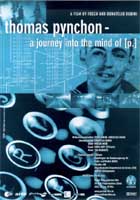Thomas Pynchon — A Journey into the Mind of [P.]
- At January 12, 2021
- By Spermatikos Logos
- In Pynchon, The Modern Word
 0
0

Thomas Pynchon—A Journey into the Mind of [P.]
Written and directed by Fosco Dubini and Donatello Dubini
Synopsis
Comments
[The film contains] a lot of well known and a some not so well known footage of the usual suspects: JFK, A3-4…, Oswald, Pavlov’s Dogs, Leary, von Braun…. Some faded photographs and distorted video captures of people supposed to be TRP. Also some lookalikes and impersonators, lovers, hunters and fans. I like the film pretty much, to me it visualises TRP’s texts as well as his imagined personae in nice elliptical pictures. So enjoy….
“Things are not as they seem.” In US writer Thomas Pynchon’s case, this is a mantra, cornerstone to a life and labyrinthine oeuvre freighted with ceaseless speculation. In books like V. and Gravity’s Rainbow, the covert arenas of the contemporary order (the military-industrial complex, governmental conspiracy, the sinister reaches of science) mesh with counter-cultural values, permeating paranoia, arcane knowledge-systems and profoundly ironic humour in an encyclopaedic investigation of modernity. Central to this is a (doomed) quest for some singular explanation of things, a motif taken up by the Dubini duo in their intriguing derive that takes in his biography, times and obsessive supporters.
On the surface it’s a tall order: Pynchon is one of the great cultural recluses, unphotographed for 40 years, his absence from the flashgun glare now an inseparable part of his “project.” So the film offers an atmospheric collage, chaptered around varying recollections and his synchronicity with resonant aspects of post-war US society. Apposite newsreel and found-footage of missile experiments and Agency psychedelics tests mix with talking heads, spoken extracts and Pynchon’s articulate fans. Stand-ins, doubles, lookalike contestants populate a shifting reality, scored to a trippy, fragmented soundscape care of The Residents, that builds towards a compelling final act, searching for the grail of a new image of the writer. Reflecting the hall of mirrors in which the novels, history, the novelist and his “researchers” move, this documentary, while uneven and occasionally over-extended, provides required viewing for devotees, and should reward those keen to explore the mysterious dynamics of the age via one of their definitive surveillants.
Thomas Pynchon (“P”), author of the celebrated but indecipherable V. and Gravity’s Rainbow, is an author whose avoidance of publicity has become legendry.
Since he slipped away from a national US magazine photographer in Mexico City after publication of V. in 1963, he has refused all requests for interviews, his whereabouts are kept a secret and “his very existence has been called into question”. If you are going to make a documentary about someone’s life there are easier people to choose.
Inevitably, with so little hard biographical data to go on, filmmakers Fosco and Donatello Dubini end up taking a wry look at the mythology and industry that has arisen around Pynchon and his work, as much as the man himself. What starts as “a journey into”, becomes “the hunt for”, P.
Interviews with scribes, webmasters and assorted Pynchonphiles fill us in on the scant biography. He went to Cornell Uni, joined the navy and worked on the Minuteman missile for Boeing. Not the kind of credentials you’d expect of a writer who had so much subversive appeal, but in the case of this enigmatic man entirely appropriate.
We also learn that he was tall, shy, sensitive, very pale, and smoked cigarettes. An old girlfriend says he was “dramatic” and liked role-playing. He liked to hand write his work first then edit it when he typed it out. “The sort of person who could turn out an almanac in a week,” adds literary critic George Plimpton.
Not surprisingly, for an author whose cryptic writings were noted for their paranoia, conspiracy theories abound. Is he Salinger? A CIA agent? A collective? Still alive? One interviewee thought he saw Pynchon in drag in his store in the Sixties, but he couldn’t be sure. Other Pynchonphiles say he might have turned up to their lookalike contest in a New York bar.
This could have been very dull stuff, and at times the obsessiveness does become trying, but the filmmakers capture the spirit and humour of the man and his myth.
Talking heads are juxtaposed with offbeat Cold War footage and recurring tunnel imagery in split screen shots, montages and slo-mo sequences. Footage is hilarious and disturbing. For example, newsreel from the Sixties depicts a discombobulated cat on LSD, while a cigarette-smoking doctor, with a nicotine-stained grin, tells us that LSD could be “a humanistic way to wage war”.
The trippy electronica soundtrack by The Residents with netherworld-sounding samples and repetitive Philip-Glass-like ditties, adds to the overall sense of things being off-kilter.
As for the mind of P? A performer who impersonated Pynchon for a Carnegie Hall awards ceremony has a good line. He remembers with amusement the audience’s confusion when he took to the podium and started his spoof acceptance speech: “They didn’t know Pincher. I didn’t know Pincher. I even think Pincher didn’t know Pincher.” It’s a sentiment that you will share by the end of this.
Additional Information
Last Modified: 29 October 2021
Back to: Pynchon and Film
Main Pynchon Page: Spermatikos Logos
Contact: quail(at)shipwrecklibrary(dot)com
